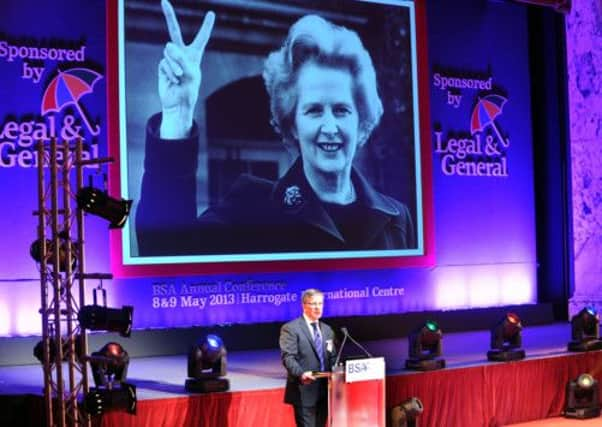Comeback of the mutuals hailed at summit


Speaking at the annual conference in Harrogate, outgoing chairman David Webster said policies from the Thatcher government could return to haunt mutual lenders and put them at a disadvantage to the big banks.
But he also heralded the return of building societies to the foreground of UK financial services.
Advertisement
Hide AdAdvertisement
Hide Ad“And, of course, in Britain we love a good comeback, don’t we? Last year, we had the comeback of all comebacks – Richard III killed in battle in 1485 but rediscovered in skeletal form in a Leicester car park.
“This comeback trumped even the masterly return of David Bowie in 2013 from a 10-year slumber.”
The comeback of mutuals is “less colourful, less vivid, but perhaps more sobering in that it tells us of the values that we now desire from our 21st century business”, said Mr Webster, who is chief executive of the Staffordshire-based Hanley Economic Building Society.
“As more traditional players we were often labelled boring in those heady days before 2007. Now we find our back-to-basics approach once more in vogue and standing us in good stead both with our customers and financially,” he added.
Advertisement
Hide AdAdvertisement
Hide AdMr Webster told the audience of industry leaders, including the CEOs of the Yorkshire, Skipton and Leeds building societies, that the Thatcherite policies of demutualisation and leverage continue to haunt the sector.
He echoed Business Secretary Vince Cable’s description of demutualisation “as one of the greatest acts of economic vandalism in modern times” with not one of the converters remaining as an independent institution.
“While it did give the public a taste of share ownership, history now shows that the UK lost far more than it gained. Indeed, the underlying business approach could well have been an early signal of the cultural ills now being very publicly suffered by our largest banks.”
And Mr Webster said the Thatcher administration’s move to “loosen the corset” on lending growth and the subsequent rise in gearing levels is seen now as a precursor to the financial crisis.
Advertisement
Hide AdAdvertisement
Hide AdHe warned that one outcome from the clean-up will be new leverage ratios that disadvantage mutuals with lower risk assets, stable funding bases and less access to capital.
Nigel Wilson, group chief executive of Legal & General, told delegates about the grave imbalances in the UK housing market.
He said: “Unfortunately, when it comes to housing, today’s politicians are trying to tackle the wrong exam question.
“Serious debate is being replaced by a series of lazy assumptions based on the political benefits of perpetually rising house prices.”
Advertisement
Hide AdAdvertisement
Hide AdHe said the housing market has an “appalling” lack of housing supply, with 30 years of house price inflation widening the gap between those inside the housing bubble and “those looking in from the outside”.
Dr Wilson, who grew up in Newton Aycliffe, County Durham, said “under supplied and over-priced” housing has a corrosive effect on social mobility and is creating inter-generational conflict.
“Why can’t we, the Government and the private sector, accelerate the building programme in the UK to create 200,000 houses per year, some built to buy, some built to rent?”
Dr Wilson told the Yorkshire Post that the Government could help by “freeing up local planning” for housing projects, which will have a multiplier effect on the wider economy.
Advertisement
Hide AdAdvertisement
Hide AdHe told the audience that building societies “remain a crucial sector” with total assets of around £700bn.
He also highlighted their important role as “the one effective channel” for financial advice for the ordinary consumer after high street banks withdrew from the advisory market.
In a debate about the political and economic environment, the newspaper columnist David Aaronovitch said British people have to decide whether they want to be the optimistic nation exemplified by the 2012 Olympics or the angry, pessimistic “Ukipland” of 2013.
“Would we like to live in Mo-land rather than Faragia?” he asked, in a reference to the double gold medal-winning athlete Mo Farah and UKIP leader Nigel Farage.
Advertisement
Hide AdAdvertisement
Hide AdThe broadcast journalist Laura Kuenssberg gave an assessment of the UK plc from her perspective as ITV business editor.
She said the economy is “stumbling along”, which means it is inevitable that the country will fall further and further behind its international rivals.
She added that most British companies outside the FTSE 100 do not pay enough attention to what the rest of the world is doing.
In yesterday’s closing session, the explorer Sir Ranulph Fiennes shared his views on employment relations.
Advertisement
Hide AdAdvertisement
Hide AdHe said: “In the UK, we have this rule to stop you sacking people who ought to be sacked. In Antarctica, we have much worse problems – you can sack them but you can’t get rid of them.”
Follow me on Twitter @bernardginns
A big share of the market
MUTUAL lenders accounted for 88 per cent of all net mortgage lending in the UK last year, according to the Building Societies Associa-tion.
This equates to £6.5bn out of £7.4bn.
Around one in three mortgages was made to a first-time buyer, said the BSA.
“My mood as I hang up my chairman’s boots is one of resurgence and optimism,” said David Webster.
Skipton Building Society chief executive David Cutter is set to be this year’s chairman.
Yorkshire mutuals employ more than 14,000 people.